Cell divison - Study guides, Class notes & Summaries
Looking for the best study guides, study notes and summaries about Cell divison? On this page you'll find 86 study documents about Cell divison.
Page 2 out of 86 results
Sort by
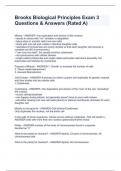
-
Brooks Biological Principles Exam 3 Questions & Answers (Rated A)
- Exam (elaborations) • 21 pages • 2024
- Available in package deal
-
- $10.99
- + learn more
Mitosis - ANSWER-• the duplication and division of the nucleus • results in clones with *no* variation or adaptation • takes place in somatic cells (non-sex cells) • starts with one cell and creates 2 identical daughter cells • replicated chromosomes are evenly divided so that each daughter cell receives a complete set (46 chromosomes) • *can occur by itself*, but usually involves cytokinesis • not synonymous with cellular division • single-celled prokaryotes and single c...
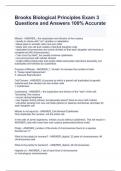
-
Brooks Biological Principles Exam 3 Questions and Answers 100% Accurate
- Exam (elaborations) • 20 pages • 2024
- Available in package deal
-
- $10.89
- + learn more
Mitosis - ANSWER_• the duplication and division of the nucleus • results in clones with *no* variation or adaptation • takes place in somatic cells (non-sex cells) • starts with one cell and creates 2 identical daughter cells • replicated chromosomes are evenly divided so that each daughter cell receives a complete set (46 chromosomes) • *can occur by itself*, but usually involves cytokinesis • not synonymous with cellular division • single-celled prokaryotes and single c...
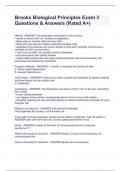
-
Brooks Biological Principles Exam 3 Questions & Answers (Rated A+)
- Exam (elaborations) • 21 pages • 2024
-
Available in package deal
-
- $7.99
- + learn more
Brooks Biological Principles Exam 3 Questions & AnsweMitosis - ANSWER-• the duplication and division of the nucleus • results in clones with *no* variation or adaptation • takes place in somatic cells (non-sex cells) • starts with one cell and creates 2 identical daughter cells • replicated chromosomes are evenly divided so that each daughter cell receives a complete set (46 chromosomes) • *can occur by itself*, but usually involves cytokinesis • not synonymous with cellular...
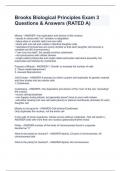
-
Brooks Biological Principles Exam 3 Questions & Answers (RATED A)
- Exam (elaborations) • 21 pages • 2024
- Available in package deal
-
- $12.99
- + learn more
Mitosis - ANSWER-• the duplication and division of the nucleus • results in clones with *no* variation or adaptation • takes place in somatic cells (non-sex cells) • starts with one cell and creates 2 identical daughter cells • replicated chromosomes are evenly divided so that each daughter cell receives a complete set (46 chromosomes) • *can occur by itself*, but usually involves cytokinesis • not synonymous with cellular division • single-celled prokaryotes and single c...

-
Brooks Biological Principles Exam 3 Questions and Answers
- Exam (elaborations) • 31 pages • 2024
- Available in package deal
-
- $13.49
- + learn more
Brooks Biological Principles Exam 3 Questions and Answers Mitosis - Answer- • the duplication and division of the nucleus • results in clones with *no* variation or adaptation • takes place in somatic cells (non-sex cells) • starts with one cell and creates 2 identical daughter cells • replicated chromosomes are evenly divided so that each daughter cell receives a complete set (46 chromosomes) • *can occur by itself*, but usually involves cytokinesis • not synonymous with ...

-
Biology 211 Final Exam Questions and Answers
- Exam (elaborations) • 30 pages • 2024
- Available in package deal
-
- $12.49
- + learn more
A Bacteria cell gives rise to 2 genectically identical daughter cells by what process Answer> Binary Fission All zygotes are Answer> diploid Products of mitosis are Answer> 2 genetically identical nuclei Replication of DNA occurs during what phase of the cell cycle Answer> S phase Mature nerve cells which are incapable of cell divison are in what stage Answer> G 1 How does a nucleus in G 1 stage differ from the one in G2 stage Answer> G 2 has twice the amount of DN...
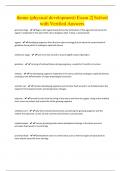
-
theme (physical development) Exam 2| Solved with Verified Answers
- Exam (elaborations) • 10 pages • 2024
-
- $11.49
- + learn more
germinal stage - begins with zygote being formed by fertilisation of the egg and ends when the zygote is implanted in the wall of the uterus (happens after 7 days). 2 week period. zygote - developing organism from the time sperm and egg fuse to about the second week of gestation during which it undergoes rapid cell divison embryonic stage - lasts from the second to around eighth week of gestation

-
BISC 262 exam 2 || with 100% Error-free Answers.
- Exam (elaborations) • 6 pages • 2024
-
Available in package deal
-
- $10.49
- + learn more
what are the five stages of the eukaryotic replication cycle? correct answers -G0 -G1 -S -G2 -M -G0- -G1 -S -G2 -M correct answers resting phase, growth and metabolism, DNA replication, Growth of structural elements, mitosis process in which bacterial cells split in two correct answers binary fission steps in binary fission correct answers 1. cell prepares for division by enlarging its cell wall, plasma membrane, and volume (DNA replication starts to form) 2. septum begins to g...

-
Robbins Chapter 2 Exam All Possible Questions and Answers with complete solution
- Exam (elaborations) • 10 pages • 2023
- Available in package deal
-
- $7.99
- + learn more
Four aspects of a disease process - Etiology - cause Pathogenesis- biochemical/molecular mechanisms of its development Morphologic changes- structural alterations in cells/organ Clinical manifestaions--functional conseqences of these changes Adaptation - Reversible changes in the size, number, phenotype, metabolic activity or functions of cells in response to change in their environment Hypertrophy--uterus in pregnancy Hyperplasia--endometrium from estrogen Atrophy--muscle disuse Metapl...

-
Bio 111 Exam 1 - Purdue University All Possible Questions and Answers with complete
- Exam (elaborations) • 7 pages • 2024
- Available in package deal
-
- $7.99
- + learn more
Cell division requires what 3 things? - Answer-1. Replication of genetic material 2. Accurate segregation of genetic material 3. Divison of the cytoplasm between two cells Main difference between prokaryotes + eukaryotes? - Answer-Size and presence of membrane bound nucleus - prokaryotes are smaller, no nucleus / membrane bound organelles What is the term used to describe about 150 nucleotides of DNA wrapped around a core of histone proteins? - Answer-nucleosome Meiotic cell division play...

That summary you just bought made someone very happy. Also get paid weekly? Sell your study resources on Stuvia! Discover all about earning on Stuvia


